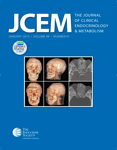J Clin Endocrinol Metab:肾移植患者不用强化血糖控制
2013-01-16 J Clin Endocrinol Metab CMT Alexa 译
美国新泽西州的Hermayer KL博士今日发表在《临床内分泌杂志》上的研究表明:不建议肾移植患者术后进行强化血糖控制治疗。 研究人员对接受肾移植的患者进行了一项随机对照试验,将104例患者随机分配到强化组或对照组,强化组接受静脉胰岛素治疗IV(强化)治疗,对照组接受标准皮下胰岛素注射SC治疗。强化组肾移植后3天接受强化IV胰岛素治疗【血糖(BG)为70~110mg/dl】,对
美国新泽西州的Hermayer KL博士今日发表在《临床内分泌杂志》上的研究表明:不建议肾移植患者术后进行强化血糖控制治疗。
研究人员对接受肾移植的患者进行了一项随机对照试验,将104例患者随机分配到强化组或对照组,强化组接受静脉胰岛素治疗IV(强化)治疗,对照组接受标准皮下胰岛素注射SC治疗。强化组肾移植后3天接受强化IV胰岛素治疗【血糖(BG)为70~110mg/dl】,对照组接受SC胰岛素治疗(BG =70~180mg/dl)。主要观察指标的主要终点为移植物功能延迟恢复(DGF),次要终点为血糖控制、移植物存活和急性排斥反应。严重低血糖(BG=350mg/dl)的发生率是主要安全性结果指标。
研究结果显示,104例患者中,有93例接受了肾移植:强化组44例,对照组49例。 强化治疗组中8例表现出DGF,对照组为12例。研究共出现9例低血糖,其中强化治疗组7例,对照组2例。此外,强化治疗组有5例患者发生30次高血糖,对照组有12例患者至少有一次高血糖。共发生11例排异反应,强化治疗组9例,对照组2例。
两个治疗组中,主要终点DGF无统计学差异。考虑血糖水平、排斥反应和移植物存活,强化治疗组患者的排斥反应风险较高。

Context: Outcomes from intensive glycemic control postrenal transplant have not been studied.
Objective: Our objective was to observe the optimal management of hyperglycemia in patients with diabetes or impaired glucose tolerance receiving renal transplantation.
Design, Setting, and Patients: We conducted a randomized controlled trial with patients undergoing renal transplantation randomized to either iv insulin therapy (intensive) or standard sc insulin therapy while the patients were admitted to the hospital.
Interventions: The study consisted of a 3-day postrenal transplant group treated with intensive iv insulin [blood glucose (BG) = 70–110 mg/dl] or a control group treated with sc insulin (BG = 70–180 mg/dl).
Main Outcome Measure: The primary endpoint was delayed graft function (DGF). Secondary endpoints were glycemic control, graft survival, and acute rejection episodes.
Results: A total of 104 patients were screened and randomized to either the intensive or control condition; however, the intention-to-treat analysis set consisted of only the 93 participants (n = 44 intensive, n = 49 control) that underwent a renal transplant. DGF was present in 18% (eight of 44) of the intensive group and 24% (12 of 49) of the control group (P = 0.46). The occurrence of severe hypoglycemia (BG < 40 mg/dl) and severe hyperglycemia (BG > 350 mg/dl) were the primary safety outcome measures. There were nine participants with hypoglycemia identified, seven of which (78%) were in the intensive treatment group (P = 0.08). There were 30 instances of hyperglycemia with five participants (11%) in the intensive group and 12 participants (24%) in the control group having at least one hyperglycemic event (P = 0.10). For the 11 rejection episodes, nine were in the intensive treatment group (P = 0.013).
Conclusions: The primary outcome measure of DGF was not statistically different for the two treatment groups. Regarding longer-term rejection and graft survival, the intensively treated participants were at higher risk for a rejection episode.
本网站所有内容来源注明为“梅斯医学”或“MedSci原创”的文字、图片和音视频资料,版权均属于梅斯医学所有。非经授权,任何媒体、网站或个人不得转载,授权转载时须注明来源为“梅斯医学”。其它来源的文章系转载文章,或“梅斯号”自媒体发布的文章,仅系出于传递更多信息之目的,本站仅负责审核内容合规,其内容不代表本站立场,本站不负责内容的准确性和版权。如果存在侵权、或不希望被转载的媒体或个人可与我们联系,我们将立即进行删除处理。
在此留言









能否扩展到一般术后管理
170
#Meta#
47
#MET#
48
#强化血糖控制#
45
#血糖控制#
56